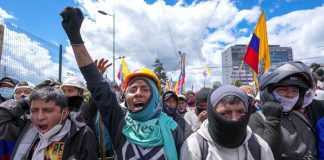In January, the government of Iceland was the first to be brought down by the global recession. Now, Iceland has moved sharply to the left following its general election in late April. The conservative Independence Party was trounced receiving its lowest vote in 80 years.
A coalition of the Social Democratic Alliance (SDA) and the Left Green Party now governs, with the SDA’s Johanna Siguroardottir becoming the world’s first openly lesbian prime minister. Both parties increased their vote but the more left wing Left Green Party proportionately did best, increasing their representation from 9 to 14 in the 63 seat parliament. The SDA has 20 seats.
The sharp shift to the left is a direct result of Iceland’s economic meltdown and the resulting political turmoil. Seven days of militant demonstrations in January—dubbed the “Saucepan revolution”—forced the government from office and new elections to be called.
For 18 years the Independence Party led Iceland down the path of neoliberal “reforms”. Taxes were cut, industry privatised, trade restrictions lowered and banks deregulated and privatised. The 2006 World Economic Freedom Index rated Iceland as the world’s fifth freest economy.
At first these reforms seemed to deliver. Iceland with a population similar to Canberra’s produced a number of billionaires and was rated number one on the United Nations’ 2008 Human Development Index.
The prosperity, however, was an illusion based on massive foreign debt. Iceland’s privatised banks borrowed cheaply on global markets and lent to entrepreneurs who went on a spending spree; buying everything from real estate, British soccer teams, shares, leading fashion brands, airlines, and banks. They bought on the expectation that the value of these assets would keep rising rather than on the revenue they generated.
So long as the cheap credit remained on tap and investors around the world—like Iceland’s entrepreneurs—kept scrambling to buy, values did keep rising. But once the global credit crunch hit, Iceland’s highly geared economy was badly exposed.
Banking collapse
With a combined debt exceeding $100 billion, Iceland’s three major banks couldn’t meet their repayments. The government stepped in, but the size of the debt—more than six times Iceland’s annual GDP—threatened to bankrupt the government.
Money flooded out of the country and the stock market at one stage lost 90 per cent of its value and the currency a third.
This collapse has had a devastating effect on Iceland’s highly indebted workers. Interest rates climbed to 18 per cent while inflation reached 18.6 per cent. Unemployment trebled between August and November 2008, while 14 per cent of workers have seen their wages cut and 7 per cent their hours reduced.
While the “Saucepan revolution” successfully forced the government out, the struggle is far from over. Iceland’s GDP is expected to fall by 10 per cent in the coming period. The IMF has been invited in as a “lender of last resort”, but help will come with conditions attached. Iceland’s nationalised health and education system could come under threat.
While most of the anger was directed at the Independence Party, the new government is not squeaky clean. The Social Democratic Alliance, formed in 1999 and inspired by Tony Blair’s New Labour, in recent years was in coalition with the Independence Party.
It would be a mistake for Iceland’s workers to put all their faith in the new government. The SDA is in favour of joining the European Union and has put the proposal to the Parliament. The Left Green Party is opposed.
Meanwhile, Iceland’s annual unemployment rate, which was less than two per cent last October, rose from 8.9 per cent in March to 9.1 per cent in April.
If the high hopes in the election are going to be fulfilled, the people of Iceland need to be ready to hit the streets again.
By Mark Gillespie





